What Military Kids Want Health Providers to Know
April 4, 2023
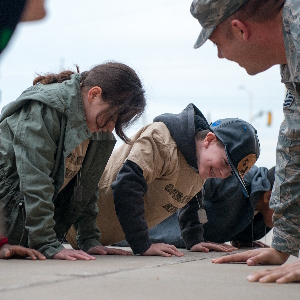
Military kids are some of the most resilient and adaptable humans around. They experience many of the same ups and downs as their civilian peers; but, for military kids, the ups and downs can happen more often and can feel more extreme.
Navigating more frequent ups and downs gives military kids superpowers like resiliency and flexibility – skills that help them withstand a lot of the challenges that come their way.
Still, many military kids need support on their journey. And the best support comes from communities and health providers who understand the unique challenges of military life.
Protective Factors in Military Children
Military children are resilient, resourceful, and adaptable. “What we find with military kids – especially those who have been through a deployment where they’ve have had their service member leave for an extended period of time – they’re actually probably more resilient and more adaptable… because they’re used to change” says Lorene Moore, Child and Youth Program Director for the Oregon National Guard.
Military children weather these ups and downs with a toolbox of protective factors. Social support and healthy families are two of the strongest factors that reduce the likelihood of adverse outcomes among military children.
Social Support
Military children thrive when they are surrounded by others who understand military life and culture. When military children are connected and feel supported by their community, they’re less likely to experience adverse outcomes.
Children who live on a military base receive more formal and informal support to reduce negative outcomes. But in states like Oregon and Southwest Washington where there isn’t a military base, social support has to be delivered more creatively.
“In Oregon, we don’t have a military base that is a hub for kids,” says Lorene Moore. “A lot of times we find that our National Guard children feel isolated and that no one understands what they’re going through, especially during a deployment. Sometimes they’re the only military child in their school.”
Through the Oregon National Guard’s Service Member and Family Support program, Lorene facilitates regular activities to help ensure military kids can connect with their peers. “We connect with them any way we can to let them know they’re not alone.”
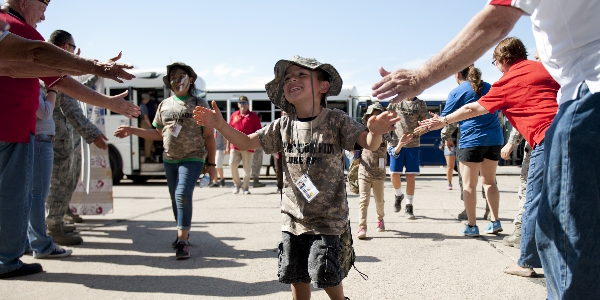
In addition to delivering a sense of community, social support helps military kids bolster their self-awareness, relationships, social behavior, and academic success.(1)
Healthy Families
Military children who experience family cohesion and healthy parenting relationships are more likely to successfully navigate the ups and downs of military life. Making it easy for military families to access the health supports they need when it comes to relationships, reunification, transitions, and trauma can have significant impacts on the health of military children.
Health professionals who work with children and families benefit from knowing if there are military connections. By knowing that a child or family is connected to the military, health professionals can get a clearer picture of the factors at play and honor the child or family’s strengths and perspectives.
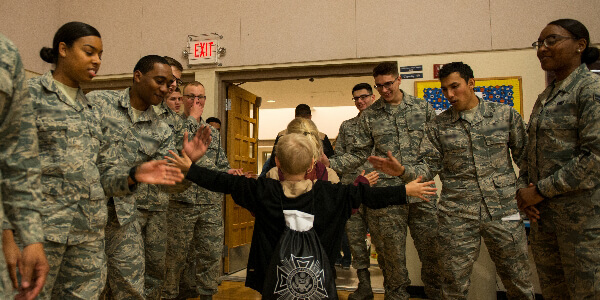
Unique Challenges Impacting Military Child Mental Health
Children in military families experience a unique set of challenges. Although military children generally adapt well to adversity,(2) certain aspects of military life increase risk factors and exacerbate the mental health journey for military children.
Military transitions pose the greatest difficulty and risk.(3) Deployments, frequent moves, and indirect exposure to conflict and violence can strain the mental health of military children.
Additionally, deployments and relocations can disrupt a family’s access to health services. A lack of continuity in health care providers (particularly, providers who don’t understand military life) can make it difficult for military families to connect with someone they trust. And a lack of trust in health providers can lead to poorer health outcomes.
The Deployment Cycle
On the whole, military children do not have poorer wellbeing than their civilian counterparts. However, military children are at greater risk of adjustment difficulties when their family has experienced a deployment.(4)
Children of all ages are more likely to struggle when a military parent is deployed. And the impact of deployments is cumulative. The more deployments, the more likely a child is to experience health challenges such as difficulty sleeping, depressive symptoms, suicidal ideation, substance use, and lower academic success.(5)
Deployments average 6 to 12 months and can be to combat or non-combat situations. During deployments, family routines are disrupted and children may worry about the safety of their deployed parent.
Family separations often mean that military kids carry more responsibilities and face a challenging reintegration process. Relationships between a deployed parent and their child(ren) often must be rebuilt from the ground up, which can be particularly difficult if the service member returns with visible or invisible injuries.
Children may experience additional emotional challenges related to a deployment if the at-home parent is struggling or if the family experiences a particularly difficult reintegration after deployment is complete.(6)
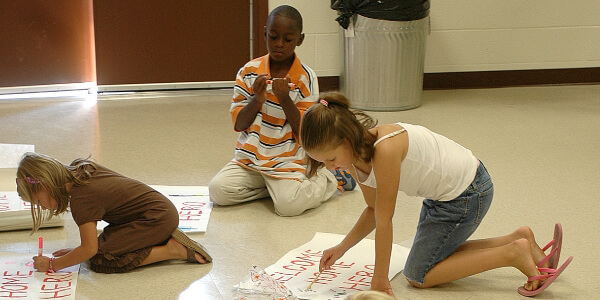
Family Moves
Military families move every two to three years on average. On average, military kids move three times more often than their civilian peers. With this degree of frequency, relocations can become an almost constant stressor for military families.
Children of military parents who made a geographic move have increased odds of mental health challenges when compared to kids who did not move.(7) That’s because moving impacts kids both academically and socially.
Some of the specific challenges kids face in the transition from one school to another include slow transfer of school records, differences in curricula between schools, adapting to new school environments and making friends, limited access to extracurricular activities, and a lack of understanding of military culture by public school teachers and staff.(8)
Access to High-Quality Health Services
Nationwide, children’s mental health has been at crisis levels since the COVID-19 pandemic. At present, accessing children’s mental health care is more difficult across all communities.
In a recent survey of active-duty families, nearly one-third of respondents felt that behavioral health services in their community were inadequate. And almost half of respondents reported difficulty accessing mental health care treatment for their children through the military’s health program.(9)
Even when military families can access needed health services, they are unlikely to receive care from a civilian health provider who is knowledgeable about the unique challenges of military life. This complicates and diminishes the health outcomes for veterans, service members, and their military families.
Healthcare providers who understand the nuance and impact of deployments, family separations, transitions, and loss are better able to meet clients where they are at and deliver better services. When healthcare professionals better understand the experiences of military children, they are better able to enhance the quality of health services and reduce barriers for military children.
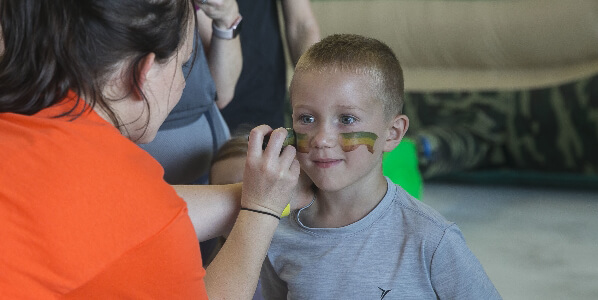
How Health Providers Can Effectively Support Military Children
Military children and youth need consistent access to high quality health services from providers that understand the unique challenges of military life.
In a survey of active-duty families with children, the top reasons their children did not receive needed mental health care included: a belief that telehealth services wouldn’t be effective for their child (38%), inability to find an available provider (30%), and difficulty finding time for an appointment (28%).(10)
“These are some of the exact reasons the Returning Veterans Project was created,” says RVP’s Executive Director Amy Almond-Schmid. “Through our network of high-quality mental and physical health providers, we want to ensure that military families can access health services free of the typical access, cost, and stigma barriers.”
Enhance Your Knowledge of the Military Child Experience
When health providers understand the unique challenges of military life, they are better equipped to meet the needs of military families and children. You can expand your awareness of military culture and your readiness to support military kids by participating in the following trainings:
- Supporting Children & Teens Who Are Grieving. Virtual training on Friday, April 28 12:30-2:00pm. Hosted by RVP and the Dougy Center
- Military-Connected Children and I Serve 2. A Center for Deployment Psychology prerecorded webinar to help clinical practitioners better identify physical, psychological, and behavioral health risk factors and co-morbidities in military-connected children.
- The Implications of Military Deployments on the Children of Current and Former Members of the U.S. Armed Forces. A Center for Deployment Psychology prerecorded webinar about military children and the implications of military deployments for those children.
- Military Children and Trauma. A Center for Deployment Psychology prerecorded webinar about military stressors that can impact a family system and common reactions in children and teens.
- Training for Youth Connected Volunteers. A PsychArmor virtual training about the unique challenges faced by military children like frequent relocation, family separation, and uncertainty.
- Veteran 201: Military Families. A PsychArmor virtual training providing insight into the unique challenges faced by military families.
- Military Child Education Coalition. Periodic virtual training for youth-serving professionals about students with parents or guardians who are wounded, ill, or injured veterans.
Volunteer
If you are a licensed provider or working under a licensed supervisor in Oregon or Southwest Washington, you can join RVP’s network of providers and clinics delivering free health services to veterans, service members, and military families. In just one to two hours a week, you can give back to those who have served our country, share your expertise with those who otherwise can’t find or afford services, and gain new skills, knowledge, and experience.
Donating as little as one hour per week, RVP volunteer health providers use our online portal to connect with veterans, service members or military families in need of free, accessible support. If you and an RVP Client agree to work together, you’ll schedule appointments when they fit with your schedule. You’ll serve your RVP Client(s) in the same way you serve your other clients and you’ll work together as long as you both deem appropriate.
Additional resources: The Oregon National Guard’s Child & Youth Program is a key resource for ensuring military children feel and stay connected to their community.
End Notes
- Military Child Education Coalition. Serving the Children of Those Who Serve Us All. Accessed April 4, 2023.
- Williamson V, Stevelink SAM, Da Silva E, et al. (2018). A systematic review of wellbeing in children: a comparison of military and civilian families. Child Adolesc Psychiatry Ment Health, 12(46).
- National Library of Medicine. (2013). Returning Home from Iraq and Afghanistan: Assessment of Readjustment Needs of Veterans, Service Members, and Their Families. National Academis Press, Washington, D.C.
- Williamson V, Stevelink SAM, Da Silva E, et al. (2018). A systematic review of wellbeing in children: a comparison of military and civilian families. Child Adolesc Psychiatry Ment Health, 12(46).
- National Library of Medicine. (2013). Returning Home from Iraq and Afghanistan: Assessment of Readjustment Needs of Veterans, Service Members, and Their Families. National Academis Press, Washington, D.C.
- Sullivan KS, Hawkins SA, Gilreath TK, and CA Castro. (2021). Mental Health Outcomes Associated with Risk and Resilience among Military-Connected Youth. Fam Process, Jun 60(2): 507-522.
- Huisman, Stacey. (2011). The Impact of PCS Moves on Your Kids. Militaryspouse.com. Accessed April 4, 2023.
- Military Child Education Coalition. (2001). U.S. Army secondary education transition study: Executive summary. Arlington, VA: Military Resource Center.
- Hero, JO, Gidengil CA, Qureshi N, Tanielian T, & CM Farmer. (2021). Access to Health Care Among TRICARE-Covered Children. Santa Monica, CA: RAND Corporation.
- Blue Star Families. (2021). 2021 Military Family Lifestyle Survey Comprehensive Report: Military Children’s Mental Health. Accessed April 4, 2023.
** The appearance of U.S. Department of Defense (DoD) visual information does not imply or constitute DoD endorsement.
Share this online:




